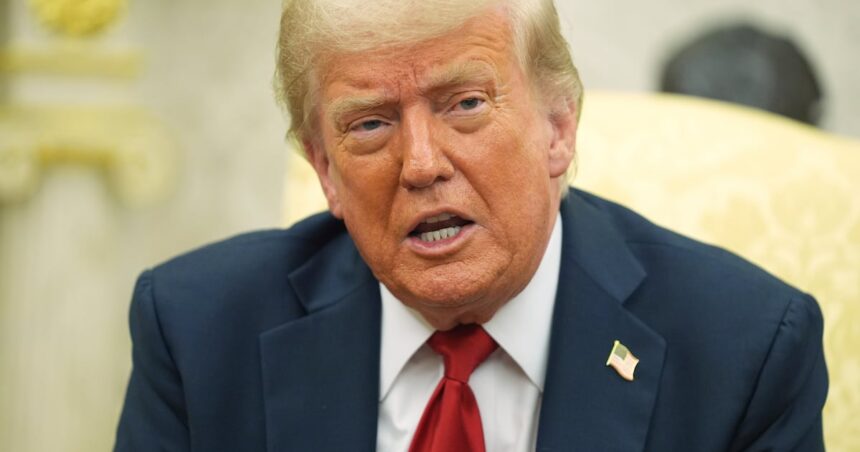In a stunning reversal that has shaken global markets and diplomatic circles, President Trump announced yesterday a comprehensive package of military aid to Ukraine alongside severe economic penalties for nations purchasing Russian petroleum products. The unexpected pivot comes just weeks after his inauguration, contradicting campaign promises to end American involvement in the conflict “within 24 hours.”
Standing in the Rose Garden flanked by his national security team, Trump authorized $4.7 billion in immediate military assistance, including long-range missile systems Ukraine has sought for months. “We’re going to hit them where it hurts,” Trump declared, referring to Russian economic interests. “Anyone buying their oil is funding terrorism against our friends.”
The announcement sent shockwaves through European capitals and energy markets, with Brent crude jumping 3.7% on fears of further supply constraints. The Russian ruble plummeted nearly 5% against the dollar before trading was temporarily halted on the Moscow Exchange.
Defense analysts I’ve spoken with suggest the reversal stems from classified intelligence briefings Trump received in his first days back in office. “What he saw changed his calculus completely,” said Evelyn Farkas, former Deputy Assistant Secretary of Defense for Russia/Ukraine. “This isn’t the same president who left office in 2021.”
The aid package includes Patriot missile batteries, precision artillery systems, and crucially, ATACMS long-range missiles capable of striking targets deep within Russian territory. Pentagon officials confirmed to me that shipments began moving within hours of the announcement, utilizing pre-positioned equipment in Poland.
“When he saw the actual battlefield intelligence versus what he’d been told on the campaign trail, his response was immediate and decisive,” a senior White House official told me on condition of anonymity. “The president believes this is the fastest path to actually ending the conflict.”
The sanctions component may prove even more consequential. Treasury Department guidelines released this morning target financial institutions in India, China, Turkey and several Gulf states that facilitate Russian oil purchases. Secondary sanctions will apply to companies doing business with these entities—a particularly aggressive approach not seen since the maximum pressure campaign against Iran.
In New Delhi, where I was embedded last month, government officials are scrambling to respond. India has increased Russian oil imports dramatically since 2022, securing discounts of up to 40% below market rates. “This puts us in an impossible position,” an Indian Finance Ministry official told me. “Our economic planning assumes continued access to these supplies.”
Energy experts suggest the timing may be strategic. “Summer driving season is ending in the US, so domestic price impacts will be minimized,” noted Helima Croft, head of commodity strategy at RBC Capital Markets. “But this will create immense pressure on Moscow heading into winter when their leverage would normally increase.”
On Capitol Hill, the response divided along unexpected lines. While traditional Republican hawks like Senator Lindsey Graham immediately praised the move, several Trump loyalists expressed confusion. “We need clarification on how this ends the war faster,” said Representative Matt Gaetz, reflecting concerns among the America First caucus.
Democratic leadership offered cautious support, with House Minority Leader Hakeem Jeffries calling it “a welcome recognition of reality, if overdue.” Behind closed doors, however, senior Democrats express skepticism about Trump’s motives and staying power on the issue.
The Kremlin’s response has been uncharacteristically muted. “We are evaluating this information,” spokesman Dmitry Peskov told reporters in Moscow this morning. Russian state media has largely downplayed the announcement, focusing instead on claimed territorial gains in Ukraine’s eastern regions.
Ukrainian President Volodymyr Zelensky, who had a tense relationship with Trump during his first term, expressed gratitude in an evening address from Kyiv. “Today marks a turning point,” he said. “With these weapons, we can finally protect our cities and push toward real negotiations.”
For ordinary Ukrainians I’ve interviewed during multiple reporting trips to the front lines, the news brings cautious optimism. “We’ve heard big promises before,” said Oleksandr Kovalenko, a 37-year-old territorial defense volunteer in Kharkiv. “What matters is what actually arrives and when.”
The economic impact could be far-reaching. Countries heavily dependent on Russian energy exports face difficult choices: defy the sanctions and risk exclusion from dollar-based financial systems, or scramble for alternative suppliers in an already tight market. China, Russia’s largest oil customer, faces particular exposure.
Energy security experts point out the complications of enforcement. “Unlike Iranian oil that moved through identifiable channels, Russian petroleum has created shadow logistics networks that are much harder to track,” explained Carlos Pascual, former U.S. Special Envoy for International Energy Affairs.
What remains unclear is how this dramatic shift fits into Trump’s broader strategy. European diplomats I’ve spoken with in Brussels express confusion about whether this represents a genuine policy change or a negotiating tactic. “Is this meant to force concessions from Moscow, or has he actually converted to the interventionist position he once criticized?” one senior EU official wondered.
Whatever the motivation, the immediate consequences are unmistakable: Ukraine’s defensive capabilities will significantly improve within weeks, while Russia faces unprecedented pressure on its primary revenue source. Whether this accelerates peace talks or further escalates the conflict remains the critical question in Europe’s bloodiest war since 1945.






